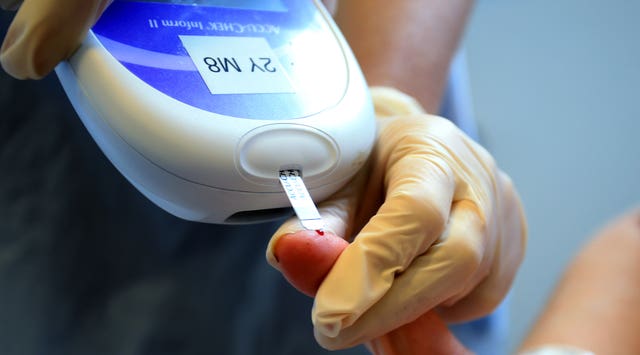
Even slim people can get remission from their type 2 diabetes by managing their calorie intake, new research has found.
A trial led by expert Professor Roy Taylor has found that 70% of participants with a low Body Mass Index (BMI) went into type 2 remission thanks to diet-controlled weight loss, despite not being obese or overweight.
Obesity increases the risk of type 2 diabetes, but 10% of sufferers have lower BMIs.
Speaking about the ReTUNE breakthrough study, Professor Taylor of Newcastle University said: “This is very good news for everyone with type 2 diabetes, not only pointing the way forward for effective return to health but also challenging the misconceptions clinging to the condition.”
His previous landmark research gave hope to millions of type 2 diabetics who were overweight by showing it was possible to go into remission through careful weight loss.
It showed that shedding fat from inside the pancreas and liver – the two key organs involved in blood sugar control – was key to remission from type 2 in people living with obesity or overweight.
Researchers have since looked at whether it would work for slimmer diabetics – with a BMI at or just above the healthy range, below 27.
They studied 20 patients and put them on a strict 800 calorie per day diet, consisting of formula meal replacements and non-starchy vegetables for 2-4 weeks, followed by a 4-6 week weight loss maintenance period which involved the gradual reintroduction of normal foods.

This cycle of weight loss and maintenance was repeated up to three times, until participants lost between 10% and 15% of their bodyweight.
After each cycle, the research team measured the amount of fat in the participants’ pancreas and liver and looked to see how remission was produced.
After 12 months, participants’ BMI averaged 22.4 down from 24.8, 70% had gone into remission and half had done so after only one weight loss cycle.
An average weight loss of around 8% of bodyweight was required for remission.
The key was losing harmful fat from the liver and pancreas, the study found.
Chris Askew, chief executive of Diabetes UK, called the research “game-changing”.
David Childs, of Cleadon, Sunderland, took part in the study and is now in remission.
He experienced headaches, his eyesight was failing and he fainted but never suspected diabetes when he was diagnosed with a BMI of 27 at the age of 48.
After successfully taking part in the trial, he said: “My declining health scared me, it is what prompted me to take action and make choices so that I can live a full, healthy life with my family.
“I exercise and eat right, and I am determined that I’ll stay in remission.”


Comments: Our rules
We want our comments to be a lively and valuable part of our community - a place where readers can debate and engage with the most important local issues. The ability to comment on our stories is a privilege, not a right, however, and that privilege may be withdrawn if it is abused or misused.
Please report any comments that break our rules.
Read the rules here